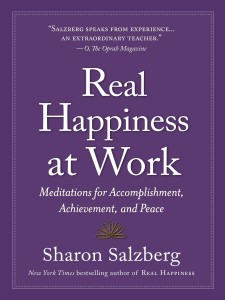You started a business to make money.
You accepted the job to feed your family, pay bills, or save for retirement. You founded a corporation because you saw a need and it could be lucrative. You took the position because it was in your field and it offered opportunities.
You didn’t accept work because it makes you happy… but it would be nice if it did. And you might actually achieve that if you read “Real Happiness at Work” by Sharon Salzberg.
Put a bunch of different-thinkers in a building. Give them tasks, salaries commensurate on experience, ability to voice their opinions, and tell them to work together. That can be recipe for drama and stress; for sure, it’s representative of the place where most full-time-working adults spend the majority of their waking hours. So how can you ensure that your experiences in that place are good ones?
Salzberg says that there are Eight Pillars of Happiness in the Workplace you should shoot for: balance, concentration, compassion, resilience, communication and connection, integrity, meaning, and open awareness.
Without the first pillar, balance, Salzberg says that it’s “hard to do a good job or enjoy our work.” Balance can be achieved through meditation, mindfulness, and allowing for “mental space,” even when you’re in a crowded room. One of the keys to balance is keeping personal life and work life separate.
Concentration allows us to focus on individual tasks, which “frees our mind of distraction and actually makes us more productive.” Humans, remember, are not well-wired for multitasking.
Compassion allows you to put yourself in someone else’s shoes, and eliminates judgment for others as well as for yourself. Utilize compassion for you, and you’ll overcome self-doubt and self-blame.
Resilience lets you bounce back “without rumination or regret.” Communication and connection promote “skillful self-expression.” Integrity keeps you on a path you can live with. Meaning allows understanding for how you experience work: is it a job, a career, or a calling? Your answer will help you find pleasure in your work.
Finally, open awareness lets you accept your job as it is, without “feeling a need” to change it. It “leads to acceptance,” and “the end of conflict” and day-to-day struggles for the illusion of control.
Let’s put this right out there: “Real Happiness for Work” is very new-agey.
Meditation and a Zen-like attitude are at the heart of author Sharon Salzberg’s teachings here. No more anger, self-doubt, or simultaneous projects; you want “one-point attention” and “loving-kindness” instead, which she says is achieved through meditation at work. That’s good in theory, but may be difficult at many workplaces I can easily think of. It may be impossible at others. Regardless, there’s no doubt that this would take plenty of practice and wouldn’t be easy.
And yet – experts know meditation works and it’s hard to argue with that.
This book was too new-agey for me but if you’re at the end of your work-rope, it might be worth a try. For you, “Real Happiness at Work” could, maybe, start a better workplace.









